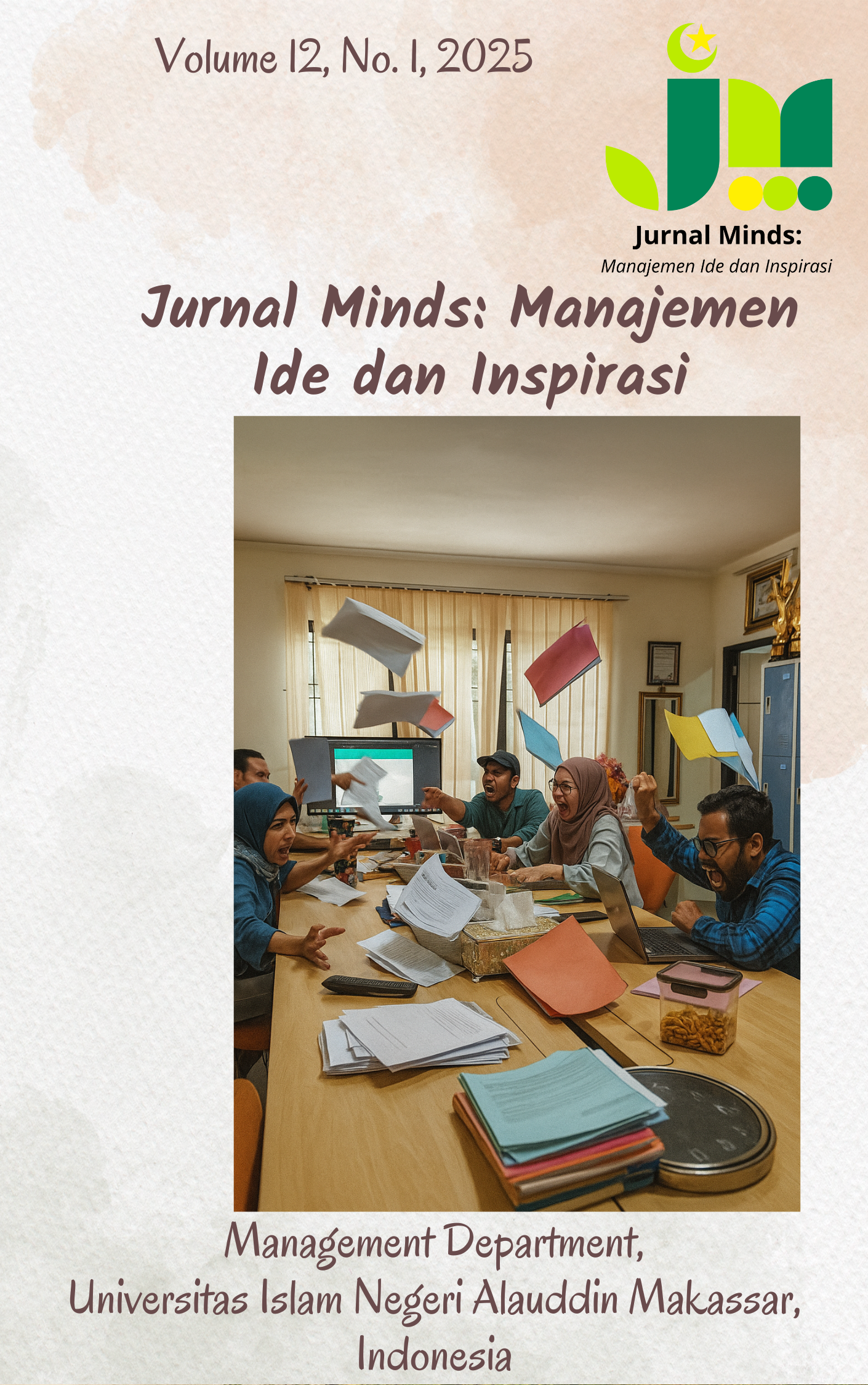Date Log
Copyright (c) 2025 Antonius Sumarwan, Andreas Dion Anggoro, Nikolas Kristiyanto, Yohanes Ignasius Setiawan (Author)

This work is licensed under a Creative Commons Attribution 4.0 International License.
First Spiritual Exercises and the Rise of Mental Wellbeing and OCB Among Credit Union Activists
Corresponding Author(s) : Andreas Dion Anggoro
Jurnal Minds: Manajemen Ide dan Inspirasi,
Vol. 12 No. 1 (2025): June
Abstract
This study investigates the effects of the First Spiritual Exercises (FSE) on mental well-being and Organizational Citizenship Behavior (OCB) among credit union activists. Contributing to the growing intersection of spirituality and organizational psychology, the study offers empirical evidence on how structured spiritual practices shape workplace behavior. A quasi-experimental design was applied to 53 activists, with the intervention group drawn from Credit Union Kridha Rahardja and the control group from Credit Union Kasih Sejahtera. Pre- and post-test analyses revealed significant improvements in mental well-being and OCB following participation in the FSE. Furthermore, mental well-being was found to have a statistically significant influence on OCB scores. These findings affirm that spiritual exercises may serve not merely as private devotion but as strategic levers for fostering psychological resilience and pro-social behavior in organizations. Managers may consider integrating reflective spiritual practices as part of employee development initiatives to promote healthier, more engaged work cultures.
Keywords
Download Citation
Endnote/Zotero/Mendeley (RIS)BibTeX
- Allen, P., Bennett, K., & Heritage, B. (2014). SPSS statistics version 22: A practical guide. Cengage Learning Australia.
- Organ, D. W. (1988). Organizational citizenship behavior: The good soldier syndrome. Lexington Books.
- Fitriani, L. K., & Wulandari, L. (2021). Organizational citizenship behavior in the construction of Islamic Boarding School: A Structural Model. Jurnal Minds: Manajemen Ide Dan Inspirasi, 8(1), 141–154. https://doi.org/10.24252/minds.v8i1.21034
- Maruyama, G., & Ryan, C. S. (2014). Research methods in social relations. John Wiley & Sons.
- Michael Hansen. (2013). The First Spiritual Exercises. Ave Maria Press.
- Hansen, M., & Sumarwan, A. (2021). Latihan rohani pemula: Damai sejati dalam cinta Ilahi. Jaringan Doa Bapa Suci Sedunia.
- Podsakoff, P. M., MacKenzie, S. B., Moorman, R. H., & Fetter, R. (1990). Transformational leader behaviors and their effects on followers’ trust in leader, satisfaction, and organizational citizenship behaviors. The Leadership Quarterly, 1(2), 107–142. https://doi.org/10.1016/1048-9843(90)90009-7
- Sekaran, U., & Bougie, R. (2016). Research methods for business: A skill building approach. John Wiley & Sons.
- Shadish, W. R., Cook, T. D., & Campbell, D. T. (2002). Experimental and quasi-experimental designs for generalized causal inference. In Experimental and quasi-experimental designs for generalized causal inference. Houghton, Mifflin and Company.
- Soelton, M. (2023). How did it happen: Organizational commitment and work-life balance affect organizational citizenship behavior. JDM (Jurnal Dinamika Manajemen), 14(1), 149–164. https://doi.org/10.15294/jdm.v14i1.41493
- Sumarwan, A., Luke, B., & Furneaux, C. (2021). Putting members in the centre: examining credit union accountability as member-based social enterprises. Qualitative Research in Accounting & Management, 18(2), 228–254. https://doi.org/10.1108/QRAM-11-2019-0126
- Sumarwan, A., Tjahjadi, A. M., & Wibisono, H. S. A. (2023). Dampak mengikuti Latihan Rohani Pemula (LRP) terhadap sikap positif dan sikap negatif pada Tuhan serta kesehatan mental (mental wellbeing). Spiritualitas Ignasian: Jurnal Kerohanian Dalam Dunia Pendidikan, 23(1), 4–26. https://doi.org/10.24071/si.v23i1.7121
- Tennant, R., Hiller, L., Fishwick, R., Platt, S., Joseph, S., Weich, S., Parkinson, J., Secker, J., & Stewart-Brown, S. (2007). The Warwick-Edinburgh mental well-being scale (WEMWBS): Development and UK validation. Health and Quality of Life Outcomes, 5, 1–13. https://doi.org/10.1186/1477-7525-5-63
- Ward, A. M., & Mckillop, D. G. (2011). An examination of volunteer motivation in credit unions: Informing volunteer resource management. Annals of Public and Cooperative Economics, 82(3), 253–275. https://doi.org/10.1111/j.1467-8292.2011.00438.x
- World Health Organization, Victorian Health Promotion Foundation, & The University of Melbourne. (2004). Summary report: Promoting mental health. Concepts, emerging evidence, practice. https://iris.who.int/bitstream/handle/10665/42940/9241591595.pdf
References
Allen, P., Bennett, K., & Heritage, B. (2014). SPSS statistics version 22: A practical guide. Cengage Learning Australia.
Organ, D. W. (1988). Organizational citizenship behavior: The good soldier syndrome. Lexington Books.
Fitriani, L. K., & Wulandari, L. (2021). Organizational citizenship behavior in the construction of Islamic Boarding School: A Structural Model. Jurnal Minds: Manajemen Ide Dan Inspirasi, 8(1), 141–154. https://doi.org/10.24252/minds.v8i1.21034
Maruyama, G., & Ryan, C. S. (2014). Research methods in social relations. John Wiley & Sons.
Michael Hansen. (2013). The First Spiritual Exercises. Ave Maria Press.
Hansen, M., & Sumarwan, A. (2021). Latihan rohani pemula: Damai sejati dalam cinta Ilahi. Jaringan Doa Bapa Suci Sedunia.
Podsakoff, P. M., MacKenzie, S. B., Moorman, R. H., & Fetter, R. (1990). Transformational leader behaviors and their effects on followers’ trust in leader, satisfaction, and organizational citizenship behaviors. The Leadership Quarterly, 1(2), 107–142. https://doi.org/10.1016/1048-9843(90)90009-7
Sekaran, U., & Bougie, R. (2016). Research methods for business: A skill building approach. John Wiley & Sons.
Shadish, W. R., Cook, T. D., & Campbell, D. T. (2002). Experimental and quasi-experimental designs for generalized causal inference. In Experimental and quasi-experimental designs for generalized causal inference. Houghton, Mifflin and Company.
Soelton, M. (2023). How did it happen: Organizational commitment and work-life balance affect organizational citizenship behavior. JDM (Jurnal Dinamika Manajemen), 14(1), 149–164. https://doi.org/10.15294/jdm.v14i1.41493
Sumarwan, A., Luke, B., & Furneaux, C. (2021). Putting members in the centre: examining credit union accountability as member-based social enterprises. Qualitative Research in Accounting & Management, 18(2), 228–254. https://doi.org/10.1108/QRAM-11-2019-0126
Sumarwan, A., Tjahjadi, A. M., & Wibisono, H. S. A. (2023). Dampak mengikuti Latihan Rohani Pemula (LRP) terhadap sikap positif dan sikap negatif pada Tuhan serta kesehatan mental (mental wellbeing). Spiritualitas Ignasian: Jurnal Kerohanian Dalam Dunia Pendidikan, 23(1), 4–26. https://doi.org/10.24071/si.v23i1.7121
Tennant, R., Hiller, L., Fishwick, R., Platt, S., Joseph, S., Weich, S., Parkinson, J., Secker, J., & Stewart-Brown, S. (2007). The Warwick-Edinburgh mental well-being scale (WEMWBS): Development and UK validation. Health and Quality of Life Outcomes, 5, 1–13. https://doi.org/10.1186/1477-7525-5-63
Ward, A. M., & Mckillop, D. G. (2011). An examination of volunteer motivation in credit unions: Informing volunteer resource management. Annals of Public and Cooperative Economics, 82(3), 253–275. https://doi.org/10.1111/j.1467-8292.2011.00438.x
World Health Organization, Victorian Health Promotion Foundation, & The University of Melbourne. (2004). Summary report: Promoting mental health. Concepts, emerging evidence, practice. https://iris.who.int/bitstream/handle/10665/42940/9241591595.pdf
